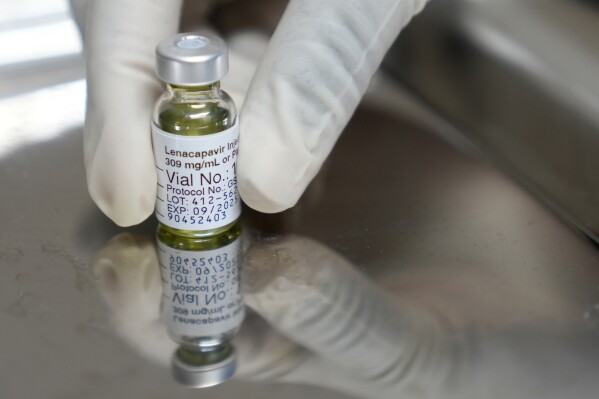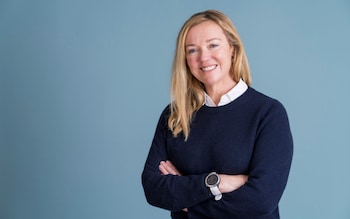Abdallah Alabadla remembers the night he thought he was going to die. The college student had fled his home in Gaza City for Khan Younis, a place he thought would be safer. But soon after arriving, he found the city emptied of critical medical supplies.
"I went to every pharmacy in the area where I was staying, desperately looking for insulin," he said in a phone interview from Cairo, where he evacuated in March. "I thought I was going to die because I didn't find it. I don't know how to describe it. It was a horrible moment."
Alabadla, 23, was in his final semester at Al-Aqsa University, where he studied English literature before the October 7 attacks on Israel by Hamas and subsequent Israeli invasion of Gaza. He also has Type 1 diabetes and relies on taking insulin daily to stay alive.
Before the launch of Israel's offensive seeking to release the Israeli hostages and destroy Hamas, United Nations bodies estimated that up to 71,000 Palestinians in Gaza were living with diabetes as of November 2023. It is not known now how many of them have since fled or been killed.
Insulin is one of the medicines in "acute shortage" in Gaza, according to the World Health Organization, recalling a time before the advent of insulin therapy, when having diabetes—today considered a treatable condition—almost always meant a death sentence within a matter of days or weeks.
Alabadla and others say they have gone to extreme measures to survive the shortage. They now frequently switch between multiple types of insulin based on availability rather than what is recommended for their unique needs, use expired insulin or resort to insulin rationing—a potentially fatal practice.
Dr. Waseem Alzaanin is a physician in Deir al-Balah, in central Gaza. Like Alabadla, he has Type 1 diabetes.
"If the situation continues as it is now, we are going to have a disaster for diabetic patients, especially the Type 1 kids," he said in a phone interview in June.
People with Type 1 diabetes produce little or no insulin and need to administer it every time they eat. For them, going even a little while without access to insulin therapy can become very dangerous very quickly.
"During my work at the clinic, I saw an 8-year-old, Type 1 girl," Alzaanin said. "She didn't have any insulin and she went into diabetic ketoacidosis, a complication from Type 1 diabetes."
The clinic doctors sent her to the hospital, which also had a shortage of supplies and beds.
"They dealt with her as an outpatient," he said. "But after that, I don't know if she lived or died. I assume she lived, but her condition was very, very bad when I saw her."
The Helpers
In addition to working as a doctor for an international aid organization, Alzaanin, 25, is also a member of a small, grassroots, mutual aid society that, since the Israeli invasion of Gaza, works with international bodies trying to get insulin and other diabetic supplies to the people in Gaza that need them as well as offer them lifesaving medical advice when the right type or amount of insulin simply isn't available.
The Diabetes Humanitarian Aid Coalition, made up of doctors, policymakers and advocates, all with diabetes themselves, are a loosely organized group of volunteers in Gaza and abroad. For governments and organizations great and small, getting any aid at all through Gaza's borders has been extremely difficult, but getting insulin through is even harder.
"From the first of the attack, diabetes supplies and analog insulin were banned from entering with the humanitarian aid," Alzaanin said. Several people including diabetics and medical workers inside and outside of Gaza also told us that, at various points since October 7, Israeli authorities have temporarily banned insulin, insulin pens and other diabetic supplies from coming into Gaza.
Israel denies this. The office of Coordination of Government Activities in the Territories, the Israeli body that handles humanitarian issues and enforces border policies in Gaza and the West Bank in Palestine, said in an emailed statement that there has been no limitation on insulin pens entering into the Gaza Strip. "Since the start of the war, they have been approved for entry."
Alzaanin said that a few weeks after the October invasion, some insulin and diabetes supplies, "not a huge quantity," were allowed to enter Gaza with medical missions from Egypt.
Even getting small amounts of insulin is difficult, Alzaanin said. "For myself, I got insulin [into Gaza] three to four times, each time with a different medical mission or NGO mission that was coming from Egypt to Gaza," he said.
Alzaanin asked us not to name the organizations and governments that were able to smuggle insulin for him for fear of retaliation for violating what he said were Israel's strict policies around importing items into Gaza.
Without new insulin getting to the people who need it, often the only option is to use anything that is available.
Making Do
Hamza Al-Ghazali, 18, has had Type 1 diabetes for nine years. Before October, he was in his final year of high school and studied the oud at a music institute. Neither institution has reopened.
Now that his supply has run out, he is relying on insulin that was stored in reserve.
"It says that it expired in March," he said in a phone interview from Zeitoun, near Gaza City. He believes the old insulin is still effective but doesn't know how long it will last. Since the war began, Al-Ghazali and his family have had to move more than once to avoid bombardment. And in spaces that are overcrowded with civilians who have fled, food is scarce.
"There were some days where if we were to eat, we would eat bread made of barley, but also bread made of animal feed or something."
Dr. Mohammed Seyam, a physician and graduate student, said he hears things like this regularly from people with diabetes in Gaza, especially as food resources have dwindled and people have no choice but to eat anything that is available.
"When it comes to humanitarian aid food, it's mostly wheat, cheeses, different types of biscuits," he said in a phone interview. "But the thing is, it's going to be full of carbs."
People with Type 1 diabetes and some with Type 2 require insulin to process carbohydrates. Without insulin, their blood glucose levels are uncontrolled, leading to potential long-term complications of all major systems, among them increased risk of heart attack, stroke and blindness. For insulin-dependent diabetics, though, being without insulin for even a short time can lead to diabetic coma and death.
Seyam, 25, is originally from Gaza City but left for London in September to pursue a master's degree in health management. He also has Type 1 diabetes and works with the DHAC, giving advice to his fellow diabetics back home by internet and phone.
"I personally know patients who have had to switch between five to six types of insulin during the last seven months," he said in May.
Figuring out how much insulin to take and when—a matter of critical importance—is not necessarily straightforward when using a product with a different formula or potency.
And the lack of other supplies, such as preloaded insulin pens and even blood glucose testing strips, has also forced people to operate blindly when it comes to taking insulin, something that carries a high risk of error.
"We call this 'emotional rationing' of insulin," Seyam said, noting that without the ability to measure doses, get blood sugar readings or even predict when they will next be able to eat, patients are basically just trying to feel how much to take at a given time.
That's a problem, Seyam said, because getting too little or too much insulin can also be dangerous or fatal.
Eritrea Mussa, the founder of DHAC, knows Seyam and Alzaanin from advocacy work they did for the international diabetic community before October 7. When they started hearing from their contacts in Gaza about running out of insulin, they got in touch with other members of that community and decided to create a task-force-like project. It was born out of an urgent drive to help.
"I could not sleep on October 13th. Neither could Noor or Sarah or Serene or Mohammed"—other members of the group of friends that decided to form the coalition—said Mussa, a social media manager at the diaTribe Foundation, a nonprofit organization in San Francisco that works to educate and inform people with diabetes about their condition. She also serves as a producer for Diabetics Doing Things, a media company that specializes in entertaining advocacy content.
"We were all just crying, nonstop," she said of the October ground invasion of Gaza. "I was like, well, I don't know what we can do, but we have to do something."
Mussa, who is based in Dallas, Texas, and lives with Type 1 diabetes, said the coalition is a true mutual aid society. They operate with a P.O. Box in Los Angeles for receiving donations. Group members give their time and services and collect in-kind donations of supplies.
As a mutual aid society, there are limits to how they can help. For the past nine months, the coalition has made a few attempts to send insulin and testing supplies, but because of the closed borders and the slow deployment of aid, they haven't reached Gaza.
In April, for example, group members abroad sent a shipment of supplies to be received by Alzaanin. It was not allowed to pass through the border with Egypt. They never learned why.
"That was absolutely mind boggling, especially all the work we did to get it there," Mussa said. "And then for it to just not get to him and for it to be somewhere and us just not know where, was really frustrating."
After learning the shipment was stuck in Egypt, Alzaanin arranged to have the supplies distributed to refugees from Gaza living in Egypt so they could be used before they expired.
In late June, another DHAC board member tried to send supplies from the U.S. within a larger, official shipment to Gaza's European Hospital in Khan Younis. But Alzaanin and Mussa said that when the Israeli army ordered the evacuation of the hospital on July 2, that mission was canceled.
A representative from COGAT told reporters that the evacuation had not been ordered by Israel.
'Very Difficult' to Move Aid
In recent months, the shortage of medical supplies of all kinds has only intensified.
"Since the invasion of Rafah [in May], and the closure of the crossing, no diabetes supplies or insulin is entering Gaza," Alzaanin said.
Doctors and aid workers from multiple international organizations have also reported the total standstill of all kinds of medical aid deployment—not just diabetes supplies.
Israel rejects this charge, saying by email on July 3 that "in no way does the State of Israel form a bottleneck for any aspect of the transfer of humanitarian aid into the Gaza Strip" and "there is no limit on the provision of medical assistance."
"Since the beginning of the Rafah offensive, in the first week of May, we've had actually zero supply come in," said Dr. Javid Abdelmoneim, a medical team leader in Gaza for Doctors Without Borders at Nasser Hospital in Khan Younis, in a phone interview in early July.
Abdelmoneim also said that in his unit there are no supplies available for the most critical patients, let alone the chronically ill.
While it is clear that many people who need insulin and other aid are not getting it, in such a quickly changing crisis situation, experts point to multiple causes.
Tania Hary, executive director of Gisha, an Israeli nonprofit based in Tel Aviv that promotes human rights and international law in Gaza and the West Bank, said situations like what Abdelmoneim and Alzaanin described are happening all over Gaza right now.
"The big picture is that, in general, aid is very, very difficult to move right now," she said in a phone interview. "Mainly within Gaza is the problem at this point."
She said that at other points in the war, the biggest problem was getting things from the outside into Gaza, but the situation changes frequently.
COGAT also referred to aid waiting to be distributed, saying by email that, "as of this writing [on July 3], 1,200 humanitarian aid trucks on the Gazan side of the Kerem Shalom Crossing are waiting for the UN to collect and distribute their cargoes."
Arwa Mhanna, senior advisor for policy and advocacy for the Middle East at the aid organization Mercy Corps, agreed that things are always in flux near the border.
"There are issues with restrictions on the entry of humanitarian trucks into Gaza, issues with the unpredictable rejection of items," Mhanna said in a phone interview from Amman, Jordan. "Very lengthy and complicated inspection processes, unpredictability on when the trucks would be allowed to enter [Gaza] and the wait time at the crossing points."
Mercy Corps distributes types of aid in different parts of the Gaza Strip including food, tents and hygiene kits, but Mhanna said that Israeli policy is getting in the way of groups like hers doing their job.
"We have never seen, in recent years, a conflict where the civilians are really paying, bearing the brunt to this extent," she said.
When they can't be sure if something they send will go through, Mussa said the best DHAC members abroad can do for Gaza's diabetics is help them get in touch with a medical professional nearby who may have more information or, on rare occasion, small amounts of insulin—usually Dr. Alzaanin.
On occasion, he finds insulin through unofficial channels or personal relationships.
"Once, the owner of a pharmacy company had been storing extra medication," Alzaanin said. "He brought to me about 15 insulin pens, and he told me to distribute it to people who are in need. So with the help of my clinic, I managed to distribute them to children who had Type 1 diabetes."
A few times, he has been able to get small amounts of insulin within other shipments aid workers expect to get through—almost like humanitarian smuggling.
"One time, a colleague told me there was a mission coming to Gaza. I asked them to bring insulin pens with them. So they brought it with them here into Gaza from Egypt."
All of the diabetes advocates and patients told us that, despite the hardships before October 7, they were able to keep their diabetes relatively under control.
"Before the war, I was managing my diabetes," Abdallah Alabadla, the college student from Gaza City, said. "I used to wake up in the morning, check my blood glucose, eat my breakfast, go to uni."
Every day after his classes, he headed to the gym where he spent hours practicing boxing, jumping rope and weightlifting.
But after the invasion, searching every day for his next dose of insulin became unbearable. And with food being so scarce, he couldn't avoid eating carbohydrates to keep his blood sugar level safe.
"I didn't have the luxury to choose my own food. I only ate what I could find," he said.
His health was deteriorating. Desperate, his extended family pooled their life savings so he could pay a private company $5,000 just to cross the border into Egypt. It was his first time ever stepping outside of the Gaza Strip.
Today, Alabadla lives in a rented apartment with relatives in Cairo, but his parents are still in Rafah. He struggles to make ends meet but, in Egypt, it is much easier for Seyam and the rest of the DHAC to support him with insulin and supplies.
Unlike Gaza, he said, just across the border in Egypt, insulin was available at every pharmacy.
"When I first left Gaza for Egypt, I was shocked at all the simple things. I mean, seeing lights on the street and seeing food and going to restaurants, talking normally to people, everything."
Virginia Jeffries is a freelance health reporter. Follow her on X @virginiajeffr

fairness meter
fairness meter
Newsweek is committed to journalism that's factual and fair.
Hold us accountable and submit your rating of this article on the meter.
Newsweek is committed to journalism that's factual and fair.
Hold us accountable and submit your rating of this article on the meter.
To Rate This Article
About the writer
Virginia JeffriesVirginia Jeffries is a journalist in New York City. You can find her on Twitter @virginiajeffr.
Virginia Jeffries is a journalist in New York City. You can find her on Twitter @virginiajeffr.
Disclaimer: The copyright of this article belongs to the original author. Reposting this article is solely for the purpose of information dissemination and does not constitute any investment advice. If there is any infringement, please contact us immediately. We will make corrections or deletions as necessary. Thank you.




